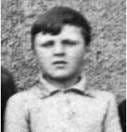What did my Uncle die for?
On freedom, armistice and the politics of division
The right to remember, in peace and dignity, those who have paid the ultimate sacrifice for those freedoms must be protected.
Who said these words? And whose sacrifice and freedoms do they reference?
Perhaps they are the words of Jewish families who mourn the brutal murder of their loved ones at the hands of Hamas one month ago?
Or maybe they are the sentiments of religious leaders in Palestine, who now oversee mass burials for civilian victims of genocide, many of whom are nameless.
It would appear not. These are the words of Prime Minister Rishi Sunak, defending my right, it seems, to mourn the life of my great-great Uncle Thomas Hewings, who died in Normandy during 1944, blown to bits by a landmine shortly after D-Day.
The Prime Minister is concerned that a pro-Palestinian protest organised for November 11th, when the WW1 Armistice is marked each year, will be an ‘affront to the British public and the values we stand for.’ To organise a protest on this day is ‘provocative and disrespectful’ he says.
‘Uncle Tom’, as my family refer to him, had aspirations of being a market gardener, but was instead one of the first men from Kingsteighton in Devon to be killed. Amid the chaos of war it took some time to find his dog tags, so his parents were initially told he was AWOL and received a visit from the military police, who suspected him of absconding. His remains are buried in Hermanville War Cemetery in Normandy, a place many members of my family have visited. The cemetery is a dignified, almost clinical place, with carefully mown lawns and well-kept graves. Walking around the surrounding town you will see buildings punctured by bullet-holes, their ageing plaster still bearing the hallmarks of violence.
Of course, I never had the opportunity to speak to my Uncle Tom, so I’ll never know for sure how he understood the cause he was fighting for. Perhaps he heard the broadcast made by Churchill in 1941 as Germany invaded the Soviet Union, which appealed to the ‘citadels of freedom and human dignity’:
None has suffered more cruelly than the Jew the unspeakable evils wrought upon the bodies and spirits of men by Hitler and his vile regime. The Jew bore the brunt of the Nazi's first onslaught upon the citadels of freedom and human dignity. He has borne and continued to bear a burden that might have seen beyond endurance. He has not allowed it to break his spirit; he has never lost the will to resist. Assuredly in the day of victory the Jew's suffering and his part in the struggle will not be forgotten.
Freedom and dignity are perhaps the noblest causes to fight for, and Churchill was correct when describing the ‘unspeakable evils’ unleashed upon the Jewish people by Hitler’s Germany. In this respect, I would like to think that Uncle Tom felt that the cause he sacrificed his life for was a just one.
But when we dig a little deeper, things become more complicated. Four years earlier, in 1937, Churchill spoke to the Peel Commission about Britain’s decision to create a ‘national home for the Jewish people’ in Palestinian territory. In light of the ensuing Arab unrest, he defended this decision in these terms:
I do not agree that the dog in a manger has the final right to the manger even though he may have lain there for a very long time. I do not admit that right. I do not admit for instance, that a great wrong has been done to the Red Indians of America or the black people of Australia. I do not admit that a wrong has been done to these people by the fact that a stronger race, a higher-grade race, a more worldly wise race to put it that way, has come in and taken their place.
The freedom and human dignity Churchill was keen to afford the Jews was not afforded to the Palestinian people. If my Uncle’s life was sacrificed according to Churchill’s vision of freedom, it would seem it was freedom for only some peoples, not freedom for all.
But I digress. Let’s revisit Sunak’s statement on the protest. Sunak is specifically saying that the right to remember the people who died for those freedoms must be protected. In his view, the right to protest for the freedom of others and the right of people to observe the Armistice ‘in peace’ are in conflict. On this occasion, Sunak considers the right to remember the dead as more sacred than the right to peacefully protest for Palestine, whose people are at ‘grave risk of genocide’ according to independent UN experts.
Reading Sunak’s statement criticising the protests reminded me of a scene in the Alan Bennet’s play The History Boys, where a schoolteacher points to a WW1 memorial and says:
Why do we not care to acknowledge them? The cattle, the body count. We still don't like to admit the war was even partly our fault because so many of our people died. A photograph on every mantlepiece. And all this mourning has veiled the truth. It's not so much lest we forget, as lest we remember. Because you should realise the Cenotaph and the Last Post and all that stuff is concerned, there's no better way of forgetting something than by commemorating it.
If I want to accurately, truthfully remember the sacrifice of my Uncle Tom, then I must acknowledge the nature in which the Second World War only sought freedom for those whom Churchill thought deserved it. That means freedom and dignity for the Jews, but not the Arabs. Freedom and dignity for the Europeans, but not the Africans. Freedom for Christians and Jews, but not the Muslims. Freedom for me and you, but not for them.
Sunak’s statement suggests that these competing rights are in tension because upholding one would impede the ‘freedoms of others’. I think whoever wrote this statement slipped up slightly, in revealing an assumption that the people who want to participate in Remembrance Day are different to those who want to march for the Freedom of Palestine.
We see this same presumptive logic play out in any number of ways. Any march demanding a Free Palestine must be anti-semitic. All Jews support the actions of the Israeli government. All Palestinians support the violence of Hamas against the Jewish people. These are false, racist and bad-faith generalisations, which have been disproven time and again.
It would be convenient for Rishi Sunak and the Home Secretary if these generalisations were true. Their desire, as with most topics, is to turn the question of Remembrance into a wedge issue, pitting two groups against each other in a cynical attempt to divide and rule. If they label behaviours as ‘offensive’ then those who participate in them are seen as subversive and radical through mere association.
It’s why we see phrases like ‘From the river to the sea, Palestine will be free’ become deeply politicised. Some Jews argue that it is a call for genocide against their people, and that any use of the term appeals to such violence. My sense is that for the majority of Palestinians it is a heartfelt imagining of an alternative reality, in which Palestinians and Jews are equally free. It is important for oppressed and colonised minorities to have a language which articulates the possibility of freedom, and we should be wary of it’s censorship, which has the effect of further silencing and osteracising the Palestinians (it’s worth remembering that communication capabilities from Gaza have successfully been targeted by Israel over the course of the past month, leaving civilians without any means to communicate with each other or the outside world).
Perhaps the pervasive colonial logic at the heart of Zionism cannot imagine that freedom for the Palestinians would not entail a loss of freedom for Israel. The irony here is that the only way Israel will ever be truly free is when it ceases to be an apartheid state: there is nothing dignified or ‘safe’ about being an oppressor, we just need to look at our own history to appreciate that. ‘The truth is’, wrote Maya Angelou, ‘that no one of us is free until everyone is free.’
This is the politics of division and colonialism. It’s an understanding of citizenship which is predicated not on the equality, liberty and freedom of every human being, but rather the privileging of some people’s rights at the expense of others. This is not true freedom, but the limited freedom imagined by our colonial ancestors, who sought to enrich their lives, and mine, at the cost of countless communities across the world.
On Saturday I will march for the freedom and dignity of Jews and Palestinians by calling for a ceasefire. I will march for the dismantling the racist colonial philosophies upon which Israel was created, and which endangers the lives of Jews and Palestinians on a daily basis. I will march for the full and uncompromising freedoms which my Uncle’s death should have made possible, because anything less is an insult to his memory.
Remembrance weekend will be ‘especially poignant’ this year, writes Sunak, ‘as we are once again reminded of the horrors of conflict and the need to continually defend our values.’
Perhaps it’s time for us to reckon with the values we seek to defend.
Thank you for reading The Murmuration.
As you can tell, the people of Palestine and Israel continue to be at the forefront of my mind. Here are some actions you can take in support of a resolution:
Donate to Medical Aid for Palestine
Sign this Amnesty International letter to Rishi Sunak calling for an immediate ceasefire and the safe return of the Israeli hostages
If they have not already done so, ask your MP to sign this Early Day Motion protecting civilians in Gaza and Israel
Boycott companies profiting from the apartheid
Attend protests or a vigil in support of a ceasefire in your area
In peace,
Grace
Golden Hour #024: finding shelter in dark times
Good evening friends, How is your heart doing? Is it broken, weary, numb? All of these feelings make sense, they’re a sign of our humanity, a sign that you care. I have felt a spectrum of emotions during the past week. Mostly I’ve felt incensed, unable to properly process the horror unfolding in the Middle East. Some nights I’ve stayed up so late reading…
how should we respond to evil?
On Saturday I stood beneath these fragile garlands, strung up by friends of ours to celebrate their adoption of two children. The new parents had spent hours folding hundreds of individual origami cranes to honour the much-awaited arrival of their new family members; a lavish expression of love, hope and longing for their children’s future.









Excellent piece Grace - the historical elements are very important & profound. Thank you so much for this. And thank you for marching on Saturday.
Maybe you could make that statement as you march.